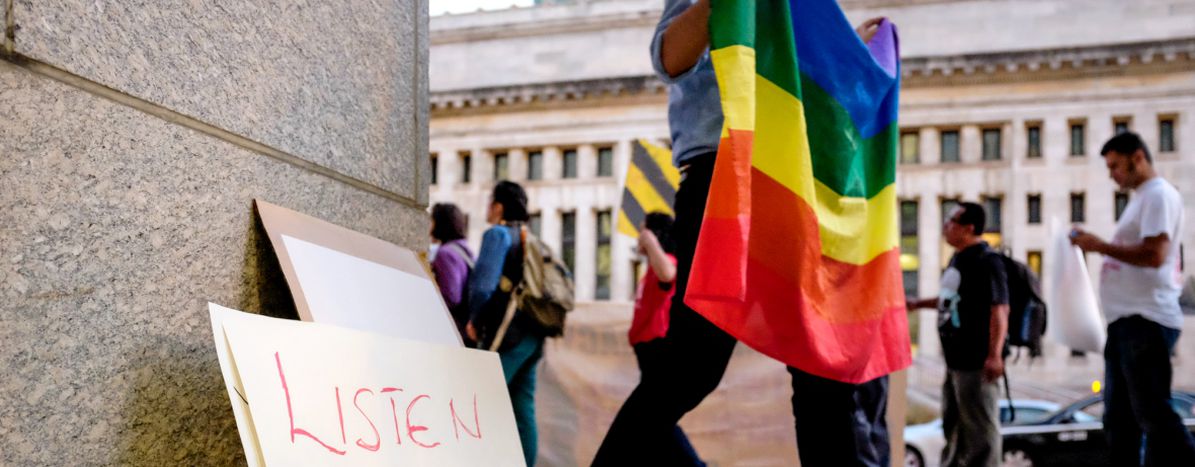
Rainbow sparks: Uncertainty for LGBT people in Romania
Published on
LGBT rights are far from universal across the European Union. In countries like Romania, it can cause heated debates and throw ordinary people's lives into turmoil.
In 2013, Adrian Coman and his American partner Robert Clabourn “Clai” Hamiltion decided to tie the knot in Brussels. They decided to move to Romania, Adrian’s home country, in the hope of leading a quiet family life. Unfortunately, Romania is less than supportive of the couple’s legal status. On 20 July, after two years spent battling the Romanian legal system, the couple learned they will have to wait until September to find out whether their marriage status will be officially accepted in Romania.
Being gay in Romania today
Adrian and Clai are just one of the many LGBT couples struggling to be accepted in Romania in 2016. It’s difficult and disheartening to comprehend how a modern-day EU country, which is on an economic and technological upward spiral, still can’t understand the necessity of granting some of its citizens the most basic rights upheld by most other EU countries. Like many other Eastern countries, Romania finds it difficult to take all the implications of Article 8 of the European Convention on Human Rights into account.
In May 2016, 3 million Romanians signed a petition launched by a group of NGOs collectively called the Family Coalition. The petition called for a change in the wording of the Article 48 of the Romanian Constitution, from “A family is created through consensual marriage between spouses” to “A family is created through consensual marriage between a man and a woman.”
This was obviously meant to draw a line at the level of moral open-mindedness promoted in other Western countries and make the Constitution on par with the Romanian Civil Code (Article 259 in particular), to the detriment of LGBT community; especially since it would have been just as “legally justifiable” to adapt the Civil Code to the Constitution.
Conservative views at loggerheads with human rights
Lawmakers and politicians in support of Romanian traditional moral values have questioned, among other things, the ethics of a child being raised by LGBT parents: lawyer Teodora Ionescu has said that "There is no way a child can be raised by two mothers or two fathers." Although backed up by 3 million signatures this statement was easily dismantled by gay marriage advocates. In fact, studies conducted both in Europe and the US have established that in countries where same-sex couples have been adopting children for years, there is no proof that those children are more inclined to homosexuality as opposed to those raised by heterosexual couples.
Some who are against gay marriage argue that the Romanian Orthodox Church will never stand behind same-sex unions, as they undermine core biblical principles. However others, like the journalist Miruna Munteanu, argue that “There needs to be a clear distinction between the spiritual and clerical institutions of marriage – nobody is asking the Church to change its ways.”
Divisive rhetoric like “Real gays are born that way… the rest is all propaganda” (from Romanian late-night TV host Mircea Badea) and the recent statement released by the Romanian government which stipulated that “[Allowing] gay marriage would be a dismissal of the importance of the institution of marriage [and] the Romanian people is not ready for this sort of change” adds to the unsettling feelings many Millennials experience in this situation.
What comes next?
Unfortunately, in an ironic turn of events, the same day Clai and Adrian discovered that their legal battle was not over yet the Romanian Parliament declared that the legal definition of “family” within Article 48 of the Constitution was eligible for review. The LGBT community greeted their decision with considerable disappointment, and supporters pleaded with parliamentarians not to forget that real people will be forced to bear the brunt of their future decisions. In an interview with VICE Romania, Adrian himself painted a heartbreaking picture of the reality he and Clai face right now: “Whatever the decision in September, that won’t change who we are or how we love one another. But if Clai ends up in hospital here tomorrow, who’s he going to be? Just another foreigner; a stranger with a foreign passport.”
The reality is that, regardless of the Parliament’s decision, the Romanian mindset is unlikely to change any time soon. From childhood, young Romanians are instilled a sense of fear against anything different or which does not fit into established social norms; a result of the long shadow cast by the former Communist regime, as well as the strong influence of the Orthodox Church (among the most conservative Christian denominations).
This shift towards greater discrimination will only mean greater turmoil in the world. Instead we should strive to treat all ideas equally, even those we don’t understand. Sometimes breaking barriers means a new and better start.



